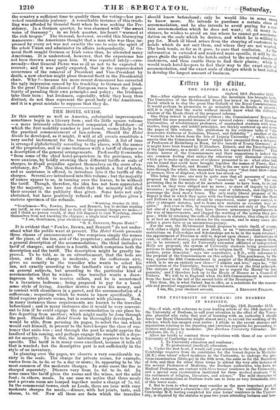£ttt tu tht
THE OXFORD HEADS.
Oxford, 10th December 1853.
Sin—After eighteen months of labour, the mountain has brought forth. The Committee of the Hebdomadal Board has issued its report, the little David which is to slay the great blue Goliath of the Royal Commissioners. It would perhaps be premature to go minutely into its details at present; still it is right that the world without should know what the collective wisdom of the Heads think of the proposed reforms. One thing indeed is abundantly evident ; the Commissioners' Report has troubled the once peaceful dreams of our revered rulers: visions of German Universities, of revolutionary professors, of unattached students with mou- staches, long pipes, and infidel principles, are thickly scattered up and down the pages of this volume. One gentleman in his evidence talks of "the democratic Cerberus of Socialism, Dissent, and Infidelity" ; another of the "warning to be taken from the fate of Leipzig University " ; while a third asserts that the Commission Report "might have emanated from a delegacy of Professors of Heidelberg or Bonn, for the benefit of Young Germany ; or it might have been framed by D'Alembert, Diderot, and the Encyclopaedists of the last century, as a model of education for regenerated France." This frantic horror of the Commissioners and their suggestions is indeed the one common feeling that unites the otherwise very dissimilar elements which go to make up the mass of evidence presented to us : what other link can be found that could have brought together the names of Pusey, Haw- kins, Litton, Marriott, and Round ? This is the one note of harmony that runs through the whole, this mournful wailing over "that fatal blow—blow of menace, blow of disgrace, which now has struck us."
This being the case, one may be quite sure that all measures of reform proposed by this Committee will be " moderate " and "safe." The one governing idea in the minds of its members seems to have been, to do just so much as they were obliged and no more ; to stave off inquiry by half- measures ; to give the sepulchre another coat of whitewash, and slightly to rearrange the dead men's bones. The only really liberal proposal of the Report is that in which they agree with the Commissioners "that the Head and Fellows in each Society should be empowered, under proper control, to alter or abrogate statutes, and to frame new statutes as occasion may re- quire." And even in this, by requiring the consent not only of the Visitor but also of a higher court, they have thrown unnecessary impediments in the way of improvements, and clogged the working of the system they pro- pose ; while by retaining the oath of obedience to statutes, they cling to what is at best an obligation too solemn for the occasion, and in many cases also either a grave farce or an unconscious perjury. For the rest, the Hebdomadal Board proposes-to retain itself, of course, with either a slight infusion of new blood, or an "intermediate Board" ; restrictions on Fellowships and Scholarships are to be in the main retained; the appointment of Proctors is still to depend upon chance ; distinctions of rank, or rather of money, systematically ignored by those who possess them, are to be retained ; and for University extension affiliated or independent Halls are proposed, the system of University students being pronounced perilous to discipline, to morality, and to religion itself. " Quem Deus vult perdere, prim dementat," says one contributor, a B.D., with reference to the proposal of the Commissioners on this subject. This gentleman, by the way, quotes the fifth Commandment in support of the Hebdomadal Board, which is to me an entirely new idea—" I admire and love," says he, the constitution of the University, because it is founded on the filial principle. The statutes of my own College taught one to regard the Master 'in boo parentis,' and I therefore look up to the Heads of Houses as a Council of Fathers. Wo will be to England when the fifth Commandment is removed from the head to the tail of the second table of the Decalogue." This then, Sir, is what Oxford has to offer, as a substitute for the reason- able and practical suggestions of the Commissioners.


































 Previous page
Previous page